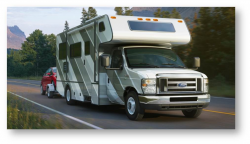
— A Ford E-Series Cutaway class action lawsuit has been dismissed after the Ford owner alleged the warranty should have covered the expense of fixing alignment problems.
Florida plaintiff Kenneth L. Boyle purchased an E-Series Cutaway which is an “incomplete vehicle” that can be finished as recreational vehicles, box trucks, ambulances or for other uses.
An “incomplete vehicle” is defined as, “[a]n assemblage consisting, at a minimum, of chassis (including the frame) structure, power train, steering system, suspension system, and braking system, . . . but requires further manufacturing operations to become a completed vehicle.”
Ford must state the “gross vehicle weight rating,” which is the heaviest weight the incomplete vehicle can safely carry once completed. Then the final stage manufacturer, “shall complete the vehicle in such a manner that it conforms to the applicable standards.”
The plaintiff purchased a 2021 Ford E-Series Cutaway that was fitted as a recreational vehicle by an RV company. The plaintiff quickly noticed the RV pulled to the left when driving. An RV company referred the plaintiff to a Ford dealer which performed an alignment for $169.
The Ford class action alleges the RV continued to pull left, so the plaintiff was again referred to Ford. The plaintiff was told, “Ford holds the warranty on the chassis” and “it could be more than just an alignment as you stated the vehicle continues to pull after you had it aligned.”
The lawsuit says the plaintiff took the RV to a second Ford dealer where he was told additional aftermarket parts were required to fix the alignment, specifically adjustable bushings. The cost of labor and parts to fix the E-Series was $855.43.
According to the class action lawsuit, the RV company said its warranty excludes coverage for defects associated with the chassis, including “steering, ride and handling.”
Ford's Motion to Dismiss the E-Series Cutaway Lawsuit
Ford does provide a Cutaway warranty, including for alignments.
“Wheel alignments and tire balancing will be provided during the first 12 months or 12,000 miles in service, whichever occurs first.” — Ford Cutaway warranty
However, Ford told the judge about this exclusion.
“The New Vehicle Limited Warranty does not cover any damage caused by alterations or modifications of the vehicle, including the body, chassis, electronics or their components, after the vehicle leaves the control of Ford Motor Company.”
This is why Ford denied the plaintiff's warranty claim.
But the plaintiff argues the warranty is "illusory."
The plaintiff contends that Ford’s warranty is illusory in that “Ford knowingly sells its incomplete vehicles to be altered and modified, and then uses an exclusion that denies warranty coverage if a vehicle is altered or modified.”
Ford argues the warranty does not cover, “any damage caused by alterations or modifications of the vehicle, including the body, chassis, electronics or their components, after the vehicle leaves the control of Ford Motor Company.”
The judge notes the plaintiff does not allege the E-Series Cutaway was misaligned once it left the Ford factory, but it became misaligned because of the modifications done by the final RV manufacturer.
The judge also ruled that although the plaintiff argues the exclusion should not apply to Ford’s promise to provide wheel alignments, he does not point to language in the warranty that supports this interpretation.
As for the Ford Cutaway warranty being illusory, the judge found the warranty does not exclude coverage for all problems that occur after the vehicle is modified, but only “damage caused by alterations or modifications.”
"Because there are circumstances under which the warranty would provide coverage, it is not illusory." — Judge George C. Steeh
The plaintiff has appealed the lawsuit dismissal to the U.S. Court of Appeals for the Sixth Circuit.
The Ford E-Series Cutaway class action lawsuit was filed in the U.S. District Court for the Eastern District of Michigan: Kenneth L. Boyle v. Ford Motor Company.
The plaintiff is represented by The Miller Law Firm, P.C., Saltz Mongeluzzi & Bendesky, P.C., and Gustafson Gluek PLLC.




